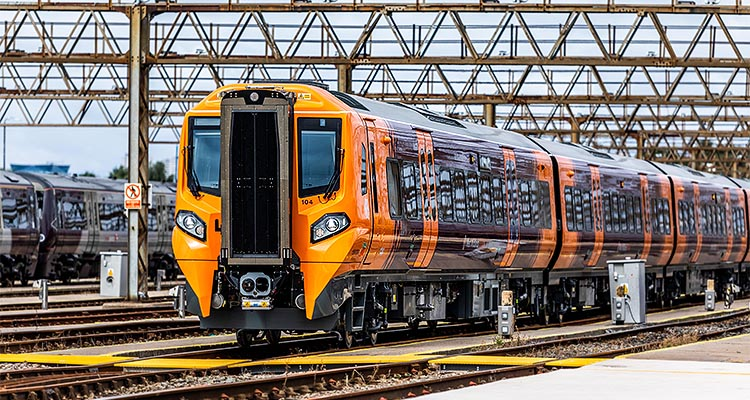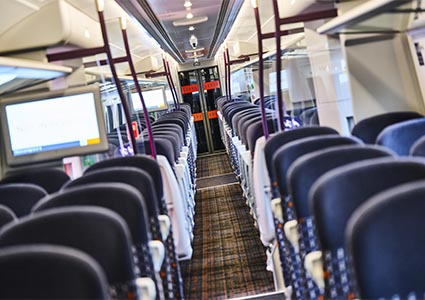
Ian McConnell, MD of West Midlands Trains, explains why innovation is crucial at a critical time for the railway
As one of the train operating companies relied on by people across Britain to get around every week, providing reliable journeys is at the heart of West Midlands Trains’ identity.
“Our services carry more than one million passengers every week, with routes connecting some of the UK’s biggest cities including London, Birmingham, and Liverpool. With a service departing roughly every 90 seconds, 363 days a year, our business is one of delivery, with our 3000 employees fully dedicated to keeping the country moving. We operate under two distinct brands – West Midlands Railway and London Northwestern Railway – with each brand having its own identity, routes and customer base,” Ian shares.

“For London Northwestern Railway, much of the focus is on providing capacity for the tens of millions of journeys we provide into London Euston each year. For West Midlands Railway, our focus is on connecting dozens of population centers and being at the heart of our community. We are proud to be part of Transport UK Group, an award-winning public transport provider which has been serving customers for more than 20 years, previously as Abellio UK. Our company has a strong track record of modernization and cost efficiency and is leading the way in creating a low carbon transport system.”
Rail travel in the UK is on the rise once again, following the severe impact of the Covid-19 pandemic on passenger numbers. While the numbers of people traveling by train are not yet back to pre-pandemic levels due to the increase in hybrid working patterns, leisure markets are performing strongly, with services in the evenings and at weekends very popular.
“To cater for this increasing demand, we are bringing forward a significant £1 billion investment in new trains and associated infrastructure, such as depot enhancements. We have already rolled out one brand new train fleet – the Class 196 – serving communities across the Midlands including Shrewsbury, Worcester and Coventry,” he elaborates.
Innovative investment
The fleet, manufactured by CAF in Spain and the UK, is made up of 80 carriages and entered passenger service in 2022. Its increased capacity and comfort continue to prove popular with passengers and the trains are now in operation on three routes as their rollout continues.
“Part of our commitment to our customers is for every single passenger to travel on either a new or upgraded train and already in 2024, we have introduced our Class 730/0 electric fleet onto the Cross City Line through Birmingham. This route, connecting the city with Lichfield, Bromsgrove, and Redditch, is one of the busiest commuter routes in the country outside London. The fleet replaces 30-year-old trains on the route and marks a steep change for our customers. With a total of 144 brand new carriages, the 730/0s can carry 30 percent more passengers than the trains they replace with features including spacious interiors and smart air conditioning.
“The biggest transformation is yet to come, with the forthcoming introduction of our Class 350/2 electric trains onto the West Coast Main Line to and from London Euston. We will introduce 36 of these trains onto our network, with the first coming into service as we head into 2025. With each train formed of five carriages, the 180-carriage fleet will bring a significant increase in capacity onto some of the busiest commuter routes in the country.
“Looking further ahead, innovation is at the heart of what we are trying to do when considering new technologies which can help make our business greener. For example, introducing hybrid trains that can switch seamlessly between electrified and non-electrified tracks. We are committed to reducing our carbon footprint and the emissions our operations create – that is rightly what our passengers would expect of us. There are lots of opportunities in this area through working with the wider industry to develop new technologies and partnerships.
 “As the operator of 150 stations across our network we recognize the opportunity for innovation here and have recently installed eco-friendly smart LED lighting across the network to reduce our carbon footprint by lighting areas only when necessary. We’re also working with the rail industry to upgrade our station buildings – recent openings include multi-million-pound schemes at Kidderminster, Wolverhampton and University (Birmingham) – as well as constructing brand new ones to bring rail connectivity to even more communities. Three new stations are on track to open in south Birmingham in 2025, with more in the pipeline at strategic locations across our network.
“As the operator of 150 stations across our network we recognize the opportunity for innovation here and have recently installed eco-friendly smart LED lighting across the network to reduce our carbon footprint by lighting areas only when necessary. We’re also working with the rail industry to upgrade our station buildings – recent openings include multi-million-pound schemes at Kidderminster, Wolverhampton and University (Birmingham) – as well as constructing brand new ones to bring rail connectivity to even more communities. Three new stations are on track to open in south Birmingham in 2025, with more in the pipeline at strategic locations across our network.
Beyond the track
“Our communities are at the heart of everything we do and in recent years we have invested millions of pounds in community projects to make the railway a destination for local people. Schemes have included the transformation of disused station buildings at Bricket Wood in Hertfordshire and Henley-in-Arden in Warwickshire into a tearoom and bar respectively. We work closely with a small army of community volunteers – more than 300 – who donate thousands of hours every year to keeping their local stations attractive, in turn improving journeys for passengers right across the network,” he enthuses.
“Keeping the railway accessible is another key priority for us and we are committed to improving the ease of use for our services and stations. We have a dedicated Stakeholder Equality Group whose function is to represent the views and interests of passengers with additional needs. We have also worked closely with a disabled passenger to introduce new facilities at stations with high passenger numbers to ensure customers can easily receive the assistance they require.
“It is not only trains and stations which bring opportunities for innovation. We meticulously plan our timetables to make sure we are using our resources in the right way, ensuring we have the right number of carriages and services to meet demand without profligate spending. We’re also committed to identifying and developing new routes and services for our passengers – our ambitious growth plans will improve connectivity and capacity. With significant change on the way in the rail industry, we believe that innovating to improve connectivity, increase passenger numbers and bring in additional revenue for the taxpayer is more vital than ever.
“Away from trains and timetables, we know our most valuable asset is our people, which is why we are committed to making our business a place where colleagues want to work. We are also committed to young people, with an active apprenticeship program, a work placement scheme and a new graduate scheme in partnership with the University of Birmingham.
“With a new government, the rail industry in the UK is set to undergo significant change and with innovation at our heart, we are fully committed to helping build a railway fit for the future,” Ian concludes.